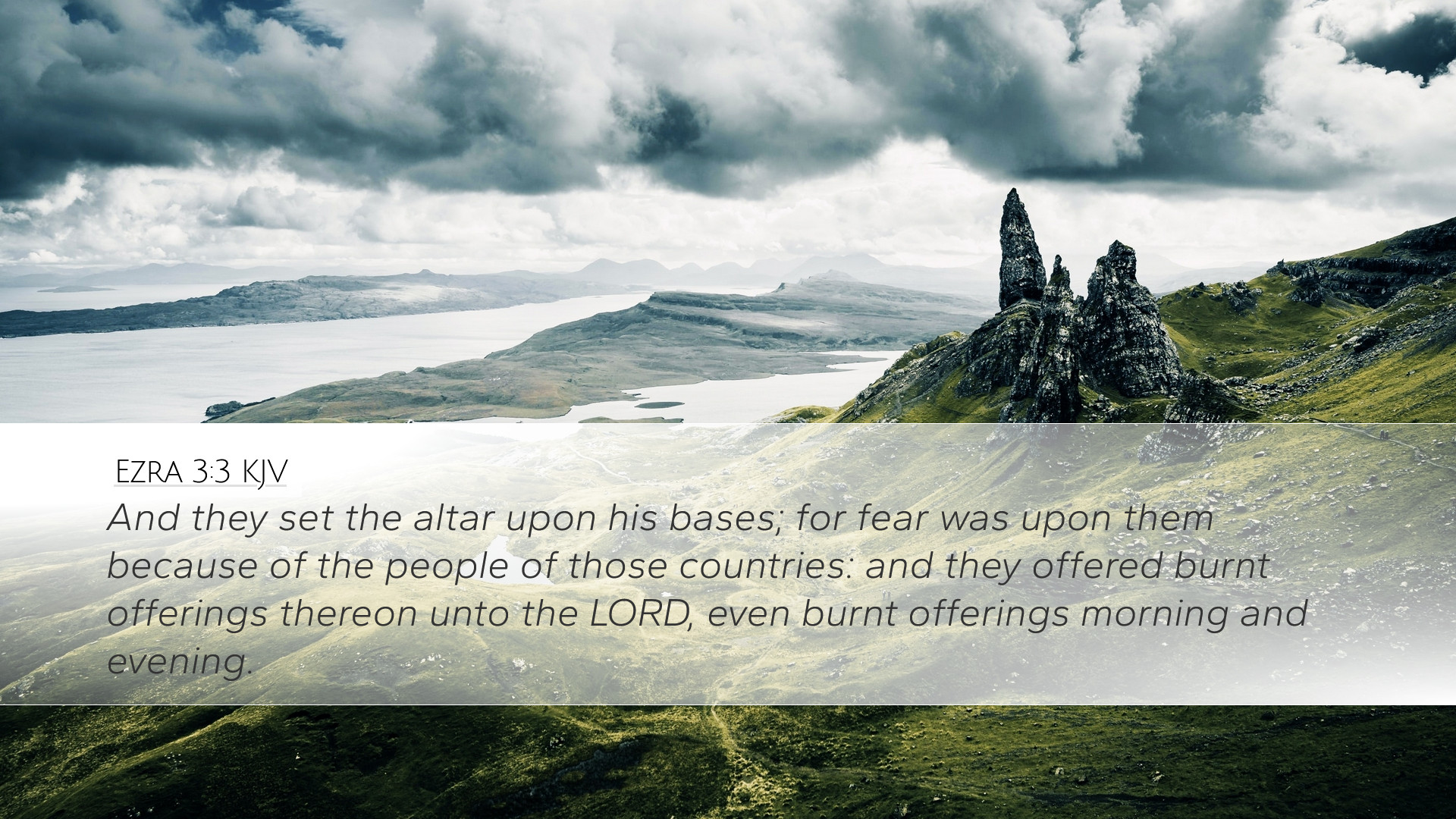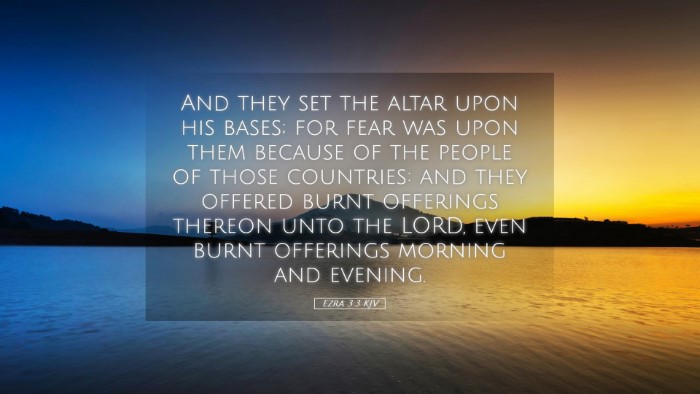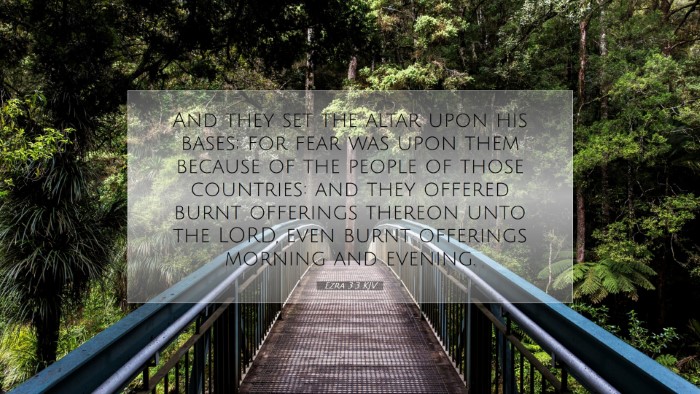Old Testament
Genesis Exodus Leviticus Numbers Deuteronomy Joshua Judges Ruth 1 Samuel 2 Samuel 1 Kings 2 Kings 1 Chronicles 2 Chronicles Ezra Nehemiah Esther Job Psalms Proverbs Ecclesiastes Song of Solomon Isaiah Jeremiah Lamentations Ezekiel Daniel Hosea Joel Amos Obadiah Jonah Micah Nahum Habakkuk Zephaniah Haggai Zechariah MalachiEzra 3:3
Ezra 3:3 KJV
And they set the altar upon his bases; for fear was upon them because of the people of those countries: and they offered burnt offerings thereon unto the LORD, even burnt offerings morning and evening.
Ezra 3:3 Bible Commentary
Ezra 3:3 Commentary
Text of Ezra 3:3: "And they set the altar upon his bases; for fear was upon them because of the people of those countries: and they offered burnt offerings thereon unto the LORD, even burnt offerings morning and evening."
Introduction
The verse under examination, Ezra 3:3, marks a significant moment in the return of the exiled Israelites to Jerusalem and the reestablishment of their worship practices. This commentary seeks to explore its historical context, theological implications, and applicable lessons for contemporary readers.
Historical Context
Matthew Henry notes that this event occurs after the Babylonian exile, during a period when the Israelites faced the daunting task of rebuilding their temple and restoring their national identity. Upon their return, they were surrounded by neighboring peoples who were often hostile and sought to undermine their efforts.
Albert Barnes emphasizes that the remnant of Israel operated under considerable fear due to external pressures. The "people of those countries" likely refers to local populations who were wary of a revitalized Israelite presence. Thus, the reconstruction of the altar was not merely a physical act but a defiance against these challenges and a reaffirmation of their faith in God.
The Altar and Its Significance
In Ezra 3:3, the setting up of the altar takes on great theological weight. Adam Clarke details that the altar, as the foremost element of worship, symbolizes the renewed covenant and the centrality of sacrifices in the Israelites' relationship with God. This is particularly poignant as they had been deprived of their ability to worship for years during the exile.
- Renewal of Worship: The act of establishing the altar represents a recommencement of regular worship and sacrifices, affirming the people's commitment to their faith.
- Community Cohesion: As a community, this reestablishment allowed the people to unify around their faith, which was crucial for their identity after returning from exile.
- Divine Favor: The act of offering burnt offerings signifies a desire to gain God's favor and proclaim His glory amidst their adversities.
Fear and Faith
The phrase "for fear was upon them" reveals the psychological state of the returning exiles. Matthew Henry emphasizes that despite their fear, the people acted in faith—demonstrating their commitment to God above their circumstances.
Barnes points out that this fear should not lead to paralysis, but rather a catalyst for action. True faith does not eliminate fear but compels individuals to respond in obedience regardless of the emotional turmoil. This aspect of faith in the face of fear is a recurring theme throughout the Scriptures and serves as a profound lesson for contemporary believers.
Theological Implications
At its core, Ezra 3:3 invites readers to contemplate the nature of worship, sacrifice, and fear in their relationship with God. Adam Clarke remarks that the act of offering “burnt offerings” not only highlights the submission to God but also symbolizes the totality of devotion and the need for atonement.
The burnt offerings, performed twice daily, reflect a rhythm of worship that the community established. This consistent form of devotion underlines the importance of regular engagement with God, and it serves as a model for personal and communal spiritual practices today.
Lessons for Modern Believers
For pastors, students, theologians, and Bible scholars, Ezra 3:3 offers several critical lessons:
- The Importance of Corporate Worship: As seen in the gathering to build the altar, communal worship is vital for fostering community ties and shared beliefs.
- Facing Adversity: The fear experienced by the Israelites serves as a divine reminder that faith often exists in tension with fear; believers are called to act in faith despite uncertainty.
- Consistency in Worship: The regularity of burnt offerings highlights the necessity of integrating worship into daily life; believers should cultivate habits that draw them nearer to God.
- God's Faithfulness: The return to Jerusalem and the subsequent rebuilding efforts illustrate God's faithfulness to His covenant, encouraging believers that God has not abandoned them regardless of circumstances.
Conclusion
Ezra 3:3 serves as a powerful reminder of the complexities of faith, fear, and worship in the life of the believer. It encourages a commitment to communal worship, fearless action in faith, and the significance of regular sacrificial devotion to God. Through a careful study of this verse and its context, believers are reminded of the unwavering presence of God amidst their trials and the need for personal and communal re-engagement in their faith journey.


